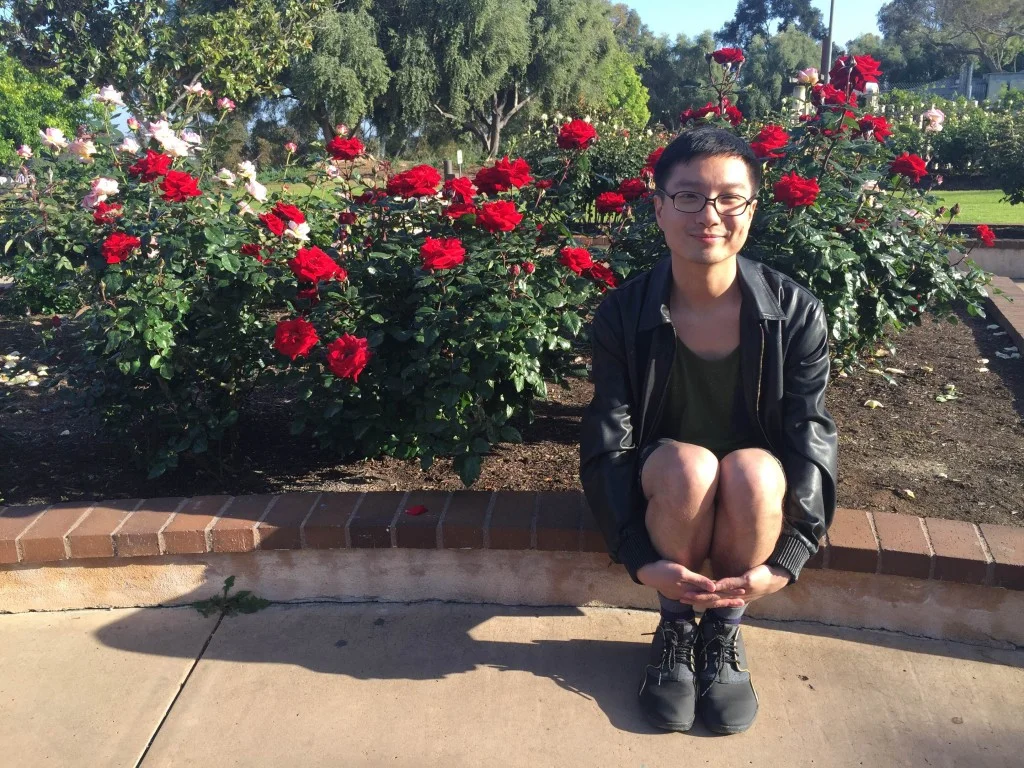Who do you think/know that you are? How does that influence the ways that you move in the world?
These questions are wonderful! I just can’t answer them in any definitive way. Any answer I give right now would be partial and dependent on whatever’s floating through my head-heart-body… so, um, I am a cleaver! Backstory: I was just in St. Louis with my dear friend Sam Herschel Wein and we were on this, like, friendship tour of the city—going around meeting all these incredible friends of Sam’s. And our last stop was at Sam’s friend Hattie’s place. We were on our way back to Chicago. And Hattie had bought all these cleavers and for some reason they gave her a LOT and so she’d been giving them out as presents. Sam got one and then mentioned how the cover of my first chapbook, Set the Garden on Fire, has cleavers on it. I chimed in, talking about the poem that image is from. Growing up, I saw my mother use a cleaver to cut everything, from big fish to super big watermelons. It’s a favorite household object, full of memories and dreams and my mother yelling at me in rapid Mandarin.
So there I was, in Sam’s friend Hattie’s living room, talking about that poem and my fondness for cleavers. And then…Hattie pulled out another cleaver! For me! I felt so honored. And deeply taken aback. Because who has cleavers to give to their friends and then also to someone she’s just met?! A stranger! A traveling poet weirdo! It was, and I don’t believe I’m exaggerating, one of the top ten moments of my youngish life thus far. Forever I will cherish this cleaver. Except the person actually using it will be my partner, Jeff Gilbert, as he is the chef of our relationship. I’m a pretty good sous chef. If you give me really exact instructions every time. Okay actually I’m a so-so sous chef. But cleavers!!
What are you most of afraid of and how have you/can you/will you use that in your creative career?
Well, I used to be most afraid of my partner walking in on me while I’m going number 2 in the bathroom but now I’m (mostly) over that—in part thanks to writing poetry about the (supposedly) ickier parts of being a human animal.
I guess my other big fear is not seeing or listening to people fully. That I’m not taking the time I need to. In a moment, in a relationship, in a poem.
I’ve been working on some new poems that feel like they’re taking different kinds of risks. I’ve been trying to write about the shooting at Pulse and it’s been such a complicated process—of doing research, of being too sad and angry to do the research, of bringing in the sorrow and rage, letting these emotions sit next to or inside the research. I worry about not getting details right or not thinking through enough the grief and the politics of this collective queer grief…how Pulse is a national grief or should be, but the loss is ultimately a local one, too, and I’m outside of that, as a distant observer. I want to stay honest to my subject position—as a queer Asian American cis man—and not assume things or come off as though I’m telling someone else’s story. I want to keep learning, but I also feel broken by the learning, when it comes to violence against queer people of color.
I hope I’m listening to this fear of not doing enough, not being present enough. I don’t want to pretend I can overcome or triumph over this fear—I think it’s an important fear. I should keep trying to do better, which doesn’t mean “perfect.” It means effort and accountability.
What other art forms colour your work? Tell me about how you stay nourished creatively.
Visual art and installation and textiles. Agnes Martin’s work. Yayoi Kusama’s. Nick Cave’s. Carrie Mae Weems’s. Barbara Kruger’s. Paul Klee’s. Ann Hamilton’s. Mickalene Thomas’s. Julie Mehretu’s. Sarah Sze’s. Anya Liao’s (St. Louis-based artist who makes all sorts of beauties, including gorgeous shirts with bok choy and gaysians on them!).
Wong Kar-wai’s movies. Especially Chungking Express and Happy Together. That moment in Chungking Express when Takeshi Kaneshiro’s character asks, “Do you like pineapple” in three languages. Takeshi Kaneshiro is such a babe.
Also, Björk.
What are your thoughts on the ideas of Power and the Voice, particularly as a writer. When have you forgotten yourself (and your power), and how did you remember who you are?
As paradoxical as it sounds, I forget myself/my power when I’m not in conversation with other creative minds. And that conversation can take the form of talking to fellow poets at a Chinese barbecue restaurant in front of an opulent and succulent Peking duck dinner…or it can take the form of reading, reading, reading. I have to get outside my own head—in order to return to my head, replenished, rebuilt. I need constant rebuilding. I get so bored with myself, my well-worn thought-paths. Conversation, good surprising conversation, shakes me out, loose.
Lately, I’ve craved talking with non-poets, those who can appreciate a poem but have no desire to write one themselves! It’s so great. People who are creative in other ways, people who are alive in their own ways, people who have things to teach me, yes. Recently I learned about: what to do with leftover Peking duck, the field of performance studies, Chicago gay bathhouse history, the existence of a plant called Gray Ghost Organ Pipe, why Wisconsin Cheese Curds are a must-get item when stopping at a Culver’s, the joys of FedEx, secret alter egos that do all the “bad” stuff you don’t get to!

